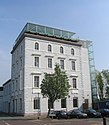Wikipedia:Today's featured list/November 23, 2018
The industrial town of Widnes contains 22 buildings that are recorded in the National Heritage List for England as designated listed buildings. Of these, 5 are classified at Grade II*, and 17 at Grade II; Widnes has no Grade I listed buildings. In the United Kingdom, the term "listed building" refers to a building or other structure officially designated as being of special architectural, historical, or cultural significance. Before 1847, the area now occupied by the town of Widnes consisted of the hamlets of Farnworth, Cronton, Appleton, and Upton; a few scattered houses; and areas of mostly marshy farmland. In 1833 a canal and a railway reached the area; the Sankey Canal was extended to a point on the River Mersey to the east of Runcorn Gap and the St Helens and Runcorn Gap Railway established a terminus adjacent to the canal. The town's listed buildings reflect its history. The oldest, St Luke's Church in the former village of Farnworth, dates from the 12th century. Also built before 1847 are three houses, a bridewell adjacent to St Luke's Church, and the lock at the terminus of the Sankey Canal. (Full list...)

